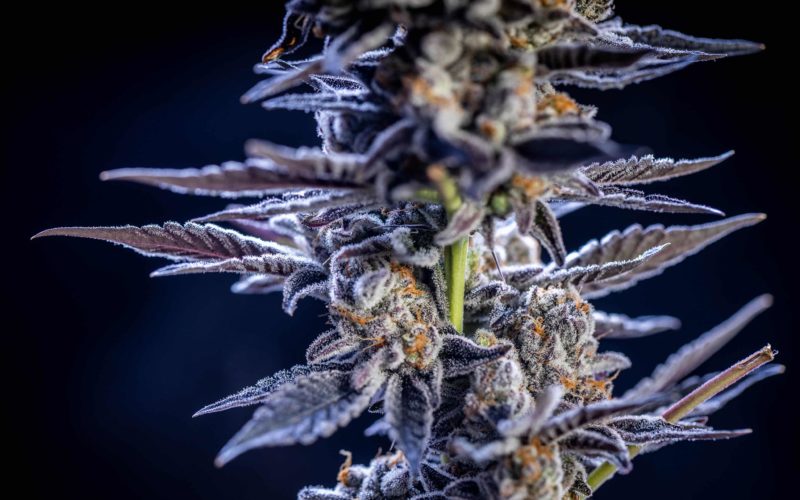Government
Pennsylvania Announces Program to Pardon Thousands of Pot Convictions

Those interested in pursuing a pardon in Pennsylvania may apply throughout September.
Pennsylvania residents who have previously been busted for cannabis now have a pathway to a clean record.
Gov. Tom Wolf and Lieutenant Gov. John Fetterman, both Democrats, announced last week the creation of the “PA Marijuana Pardon Project,” billed as an “effort to quickly pardon thousands of Pennsylvanians from minor, non-violent marijuana-related convictions.”
“This pardon project has the potential to open the door for thousands of Pennsylvanians – the college grad looking to start their career, the grandparent who’s been wanting to chaperone a field trip, or any Pennsylvanian who’s been told ‘no’ for much needed assistance. Now’s your chance,” Wolf said in the announcement on Friday.
The governor’s office said that “Pennsylvanians eligible for the opportunity to be pardoned are those with one or both of the following convictions”: “Possession of Marijuana (Title 35 Section 780-113 Subsection A31)”; and “Marijuana, Small Amount Personal Use (Title 35 Section 780-113 Subsection A31I).”
Individuals interested in applying for the program have from September 1 through September 30 to submit their applications online.
“Under the program’s timeline, applicants will be notified by Oct. 13 if they will receive a public hearing. In mid-December, the Board of Pardons will vote on individual cases in public hearings. After the conclusion of the hearings, application recommendations will be made to Wolf for pardons that he will issue prior to departing office in January,” Wolf’s office said in the press release on Friday.
Wolf and Fetterman, who is running for U.S. Senate in Pennsylvania this year, said that they were taking the action “in the absence of legislative action on legalization by the Republican-controlled General Assembly.”
“Nobody should be turned down for a job, housing, or volunteering at your child’s school because of some old nonviolent weed charge, especially given that most of us don’t even think this should be illegal,” Fetterman said in the press release.
Fetterman, who is running against Republican nominee Mehmet Oz (AKA “Dr. Oz”) in the Senate race, is a vocal champion of marijuana legalization.
Last week, ahead of President Biden’s Labor Day visit to Pittsburgh, Fetterman urged the White House to take action on cannabis reform.
“It’s long past time that we finally decriminalize marijuana,” Fetterman said in a statement. “The president needs to use his executive authority to begin descheduling marijuana, I would love to see him do this prior to his visit to Pittsburgh. This is just common sense and Pennsylvanians overwhelmingly support decriminalizing marijuana.”
That position makes for a stark contrast with Oz, who has said he is opposed to cannabis legalization, and whose campaign has mocked Fetterman’s pot-friendly policies.
In an ad released last month, the Oz campaign slammed Fetterman’s position on marijuana, and depicted a bong coming out of the Democratic candidate’s head.
“There are not enough Pennsylvanians to work in Pennsylvania,” Oz said in an interview with Newsmax in May, “so giving them pot so that they stay home is not, I don’t think, an ideal move….We need to get Pennsylvanians back at work, gotta give them their mojo, and I don’t want marijuana to be a hindrance to that.”
Fetterman, meanwhile, has not equivocated on the issue.
“I don’t want to hear any bull— coming out of Dr. Oz’s campaign trying to conflate decriminalizing marijuana with seriously harmful crime,” Fetterman said in a statement, as quoted by the Philadelphia Inquirer. “Are we supposed to believe that neither he nor any members of his staff have ever used marijuana? … I know firsthand what real crime looks like. Marijuana does not fit the bill.”
Cannabis reform advocates praised Wolf and Fetterman for the pardon program.
“It’s a good example of Gov. Wolf and Lt. Gov. Fetterman doing everything they can from the executive office on this issue,” Chris Goldstein, NORML’s Pennsylvania, New Jersey and Delaware regional organizer, said in the press release last week.
Source: https://hightimes.com/news/pennsylvania-announces-program-to-pardon-thousands-of-pot-convictions/
Business
New Mexico cannabis operator fined, loses license for alleged BioTrack fraud

New Mexico regulators fined a cannabis operator nearly $300,000 and revoked its license after the company allegedly created fake reports in the state’s traceability software.
The New Mexico Cannabis Control Division (CCD) accused marijuana manufacturer and retailer Golden Roots of 11 violations, according to Albuquerque Business First.
Golden Roots operates the The Cannabis Revolution Dispensary.
The majority of the violations are related to the Albuquerque company’s improper use of BioTrack, which has been New Mexico’s track-and-trace vendor since 2015.
The CCD alleges Golden Roots reported marijuana production only two months after it had received its vertically integrated license, according to Albuquerque Business First.
Because cannabis takes longer than two months to be cultivated, the CCD was suspicious of the report.
After inspecting the company’s premises, the CCD alleged Golden Roots reported cultivation, transportation and sales in BioTrack but wasn’t able to provide officers who inspected the site evidence that the operator was cultivating cannabis.
In April, the CCD revoked Golden Roots’ license and issued a $10,000 fine, according to the news outlet.
The company requested a hearing, which the regulator scheduled for Sept. 1.
At the hearing, the CCD testified that the company’s dried-cannabis weights in BioTrack were suspicious because they didn’t seem to accurately reflect how much weight marijuana loses as it dries.
Company employees also poorly accounted for why they were making adjustments in the system of up to 24 pounds of cannabis, making comments such as “bad” or “mistake” in the software, Albuquerque Business First reported.
Golden Roots was fined $298,972.05 – the amount regulators allege the company made selling products that weren’t properly accounted for in BioTrack.
The CCD has been cracking down on cannabis operators accused of selling products procured from out-of-state or not grown legally:
- Regulators alleged in August that Albuquerque dispensary Sawmill Sweet Leaf sold out-of-state products and didn’t have a license for extraction.
- Paradise Exotics Distro lost its license in July after regulators alleged the company sold products made in California.
Golden Roots was the first alleged rulebreaker in New Mexico to be asked to pay a large fine.
Source: https://mjbizdaily.com/new-mexico-cannabis-operator-fined-loses-license-for-alleged-biotrack-fraud/
Business
Marijuana companies suing US attorney general in federal prohibition challenge

Four marijuana companies, including a multistate operator, have filed a lawsuit against U.S. Attorney General Merrick Garland in which they allege the federal MJ prohibition under the Controlled Substances Act is no longer constitutional.
According to the complaint, filed Thursday in U.S. District Court in Massachusetts, retailer Canna Provisions, Treevit delivery service CEO Gyasi Sellers, cultivator Wiseacre Farm and MSO Verano Holdings Corp. are all harmed by “the federal government’s unconstitutional ban on cultivating, manufacturing, distributing, or possessing intrastate marijuana.”
Verano is headquartered in Chicago but has operations in Massachusetts; the other three operators are based in Massachusetts.
The lawsuit seeks a ruling that the “Controlled Substances Act is unconstitutional as applied to the intrastate cultivation, manufacture, possession, and distribution of marijuana pursuant to state law.”
The companies want the case to go before the U.S. Supreme Court.
They hired prominent law firm Boies Schiller Flexner to represent them.
The New York-based firm’s principal is David Boies, whose former clients include Microsoft, former presidential candidate Al Gore and Elizabeth Holmes’ disgraced startup Theranos.
Similar challenges to the federal Controlled Substances Act (CSA) have failed.
One such challenge led to a landmark Supreme Court decision in 2005.
In Gonzalez vs. Raich, the highest court in the United States ruled in a 6-3 decision that the commerce clause of the U.S. Constitution gave Congress the power to outlaw marijuana federally, even though state laws allow the cultivation and sale of cannabis.
In the 18 years since that ruling, 23 states and the District of Columbia have legalized adult-use marijuana and the federal government has allowed a multibillion-dollar cannabis industry to thrive.
Since both Congress and the U.S. Department of Justice, currently headed by Garland, have declined to intervene in state-licensed marijuana markets, the key facts that led to the Supreme Court’s 2005 ruling “no longer apply,” Boies said in a statement Thursday.
“The Supreme Court has since made clear that the federal government lacks the authority to regulate purely intrastate commerce,” Boies said.
“Moreover, the facts on which those precedents are based are no longer true.”
Verano President Darren Weiss said in a statement the company is “prepared to bring this case all the way to the Supreme Court in order to align federal law with how Congress has acted for years.”
While the Biden administration’s push to reschedule marijuana would help solve marijuana operators’ federal tax woes, neither rescheduling nor modest Congressional reforms such as the SAFER Banking Act “solve the fundamental issue,” Weiss added.
“The application of the CSA to lawful state-run cannabis business is an unconstitutional overreach on state sovereignty that has led to decades of harm, failed businesses, lost jobs, and unsafe working conditions.”
Business
Alabama to make another attempt Dec. 1 to award medical cannabis licenses

Alabama regulators are targeting Dec. 1 to award the first batch of medical cannabis business licenses after the agency’s first two attempts were scrapped because of scoring errors and litigation.
The first licenses will be awarded to individual cultivators, delivery providers, processors, dispensaries and state testing labs, according to the Alabama Medical Cannabis Commission (AMCC).
Then, on Dec. 12, the AMCC will award licenses for vertically integrated operations, a designation set primarily for multistate operators.
Licenses are expected to be handed out 28 days after they have been awarded, so MMJ production could begin in early January, according to the Alabama Daily News.
That means MMJ products could be available for patients around early March, an AMCC spokesperson told the media outlet.
Regulators initially awarded 21 business licenses in June, only to void them after applicants alleged inconsistencies with how the applications were scored.
Then, in August, the state awarded 24 different licenses – 19 went to June recipients – only to reverse themselves again and scratch those licenses after spurned applicants filed lawsuits.
A state judge dismissed a lawsuit filed by Chicago-based MSO Verano Holdings Corp., but another lawsuit is pending.
Source: https://mjbizdaily.com/alabama-plans-to-award-medical-cannabis-licenses-dec-1/
-

 Business2 years ago
Business2 years agoPot Odor Does Not Justify Probable Cause for Vehicle Searches, Minnesota Court Affirms
-

 Business2 years ago
Business2 years agoNew Mexico cannabis operator fined, loses license for alleged BioTrack fraud
-

 Business2 years ago
Business2 years agoAlabama to make another attempt Dec. 1 to award medical cannabis licenses
-

 Business2 years ago
Business2 years agoWashington State Pays Out $9.4 Million in Refunds Relating to Drug Convictions
-

 Business2 years ago
Business2 years agoMarijuana companies suing US attorney general in federal prohibition challenge
-

 Business2 years ago
Business2 years agoLegal Marijuana Handed A Nothing Burger From NY State
-

 Business2 years ago
Business2 years agoCan Cannabis Help Seasonal Depression
-

 Blogs2 years ago
Blogs2 years agoCannabis Art Is Flourishing On Etsy













